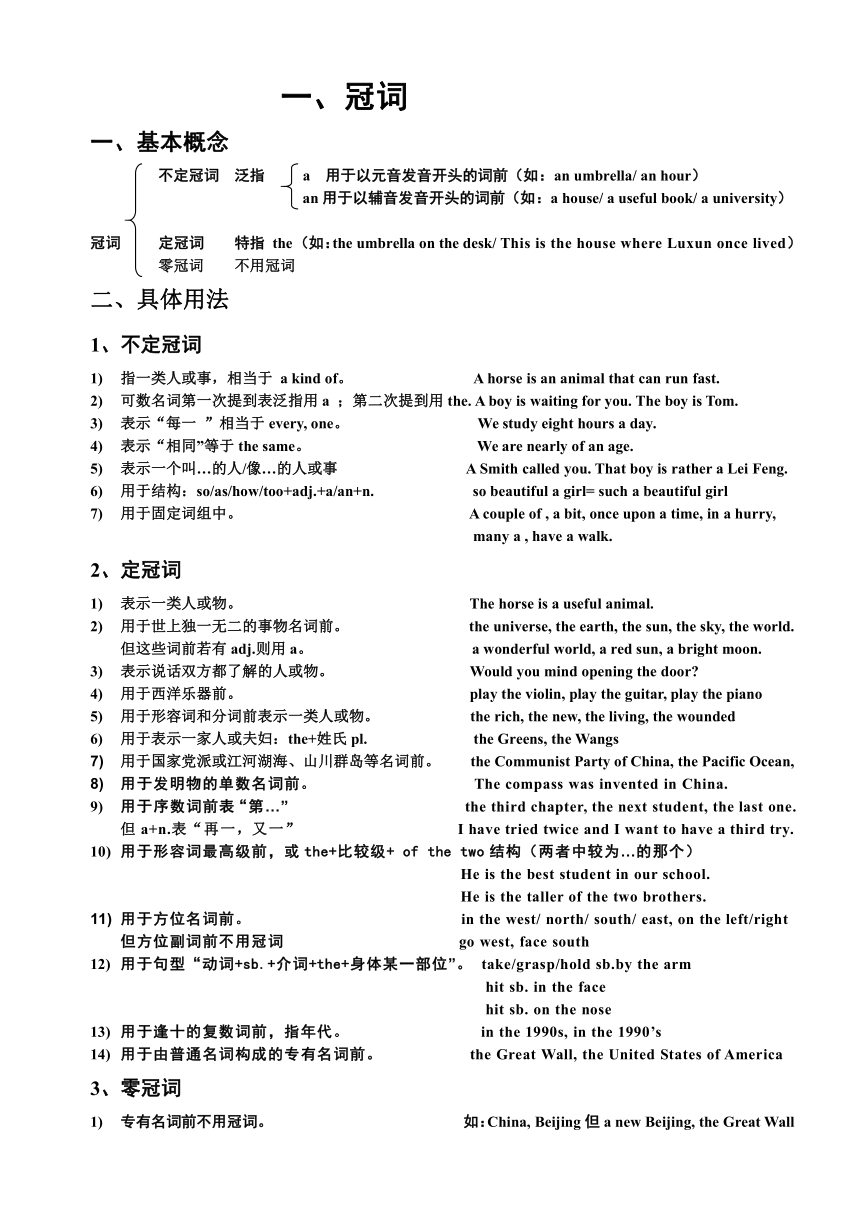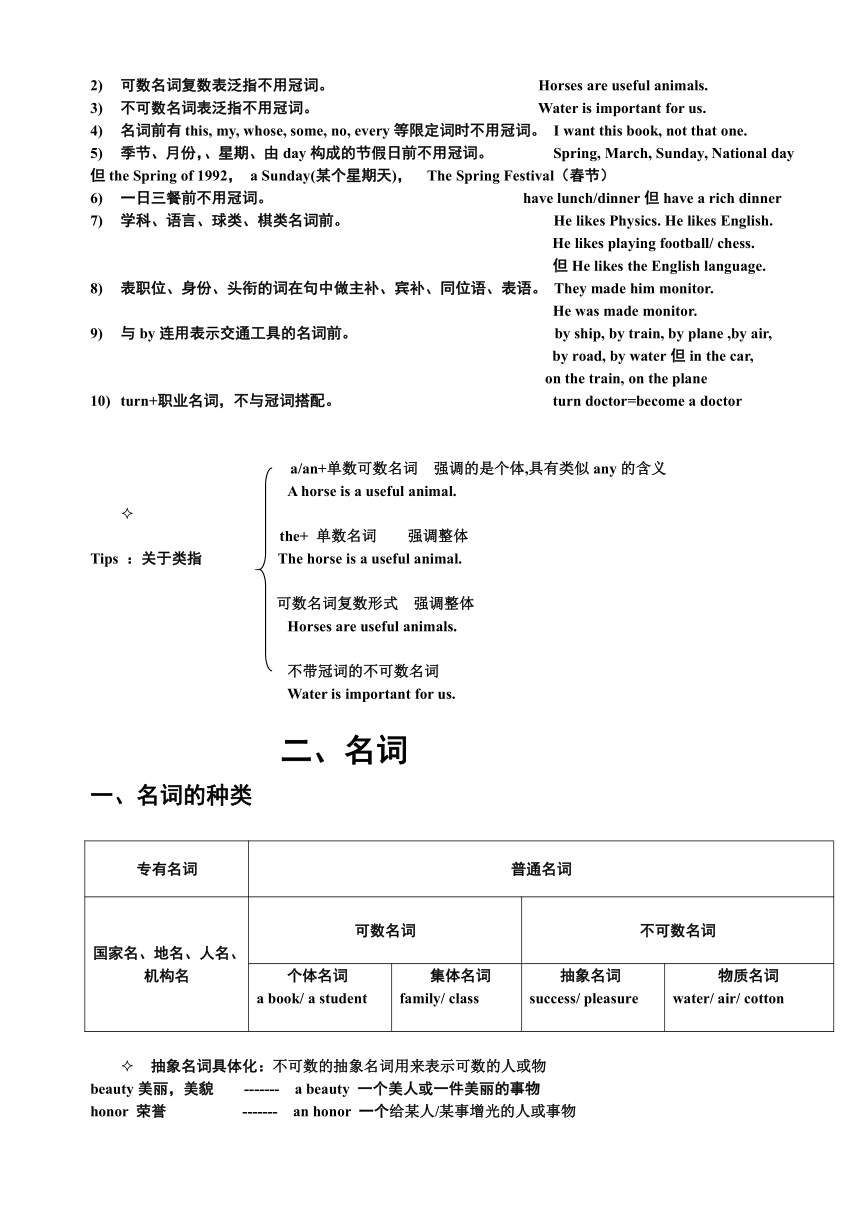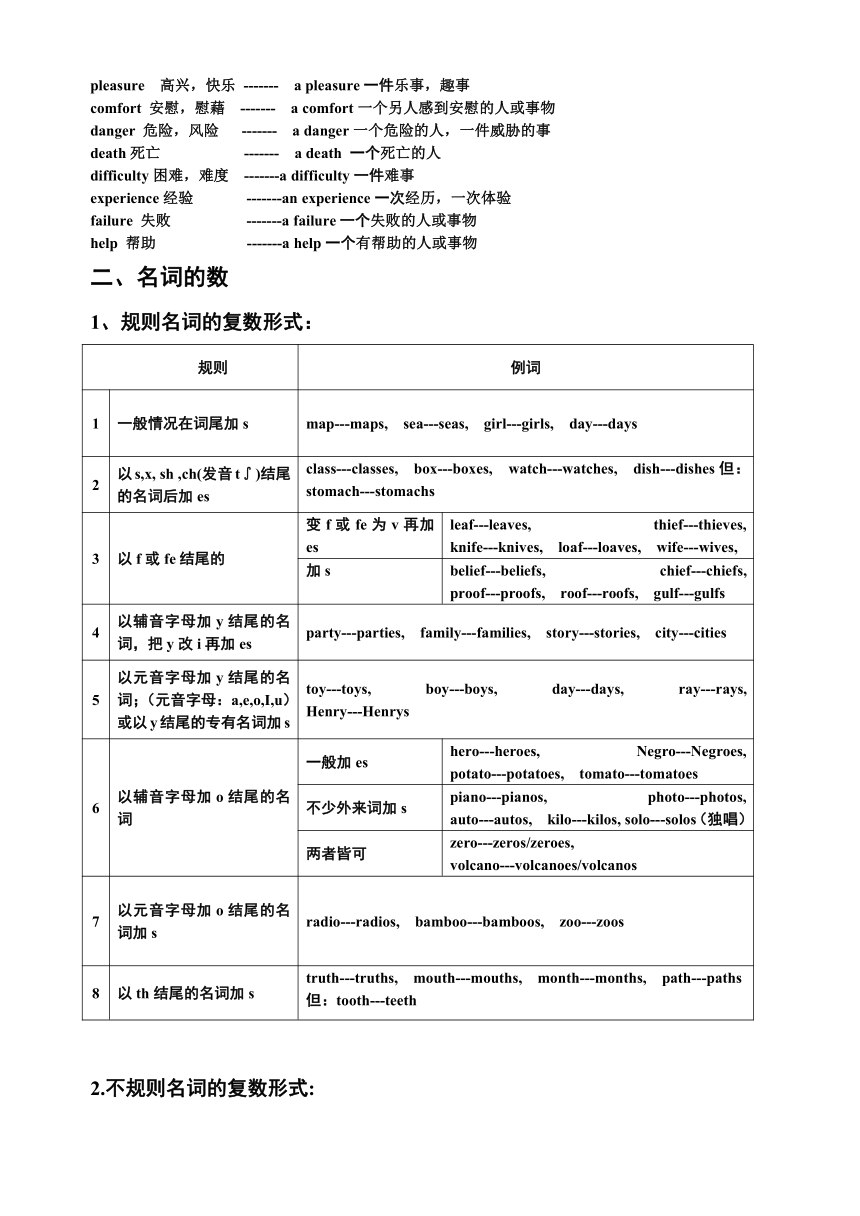冠词授课教案
图片预览



文档简介
1、 冠词
一、基本概念
不定冠词 泛指 a 用于以元音发音开头的词前(如:an umbrella/ an hour)
an用于以辅音发音开头的词前(如:a house/ a useful book/ a university)
冠词 定冠词 特指 the (如:the umbrella on the desk/ This is the house where Luxun once lived)
零冠词 不用冠词
二、具体用法
1、不定冠词
1) 指一类人或事,相当于 a kind of。 A horse is an animal that can run fast.
2) 可数名词第一次提到表泛指用a ;第二次提到用the. A boy is waiting for you. The boy is Tom.
3) 表示“每一 ”相当于every, one。 We study eight hours a day.
4) 表示“相同”等于the same。 We are nearly of an age.
5) 表示一个叫…的人/像…的人或事 A Smith called you. That boy is rather a Lei Feng.
6) 用于结构:so/as/how/too+adj.+a/an+n. so beautiful a girl= such a beautiful girl
7) 用于固定词组中。 A couple of , a bit, once upon a time, in a hurry,
many a , have a walk.
2、定冠词
1) 表示一类人或物。 The horse is a useful animal.
2) 用于世上独一无二的事物名词前。 the universe, the earth, the sun, the sky, the world.
但这些词前若有adj.则用a。 a wonderful world, a red sun, a bright moon.
3) 表示说话双方都了解的人或物。 Would you mind opening the door
4) 用于西洋乐器前。 play the violin, play the guitar, play the piano
5) 用于形容词和分词前表示一类人或物。 the rich, the new, the living, the wounded
6) 用于表示一家人或夫妇:the+姓氏pl. the Greens, the Wangs
7) 用于国家党派或江河湖海、山川群岛等名词前。 the Communist Party of China, the Pacific Ocean,
8) 用于发明物的单数名词前。 The compass was invented in China.
9) 用于序数词前表“第…” the third chapter, the next student, the last one. 但a+n.表“再一,又一” I have tried twice and I want to have a third try.
10) 用于形容词最高级前,或the+比较级+ of the two结构(两者中较为…的那个)
He is the best student in our school.
He is the taller of the two brothers.
11) 用于方位名词前。 in the west/ north/ south/ east, on the left/right
但方位副词前不用冠词 go west, face south
12) 用于句型“动词+sb.+介词+the+身体某一部位”。 take/grasp/hold sb.by the arm
hit sb. in the face
hit sb. on the nose
13) 用于逢十的复数词前,指年代。 in the 1990s, in the 1990’s
14) 用于由普通名词构成的专有名词前。 the Great Wall, the United States of America
3、零冠词
1) 专有名词前不用冠词。 如:China, Beijing但a new Beijing, the Great Wall
2) 可数名词复数表泛指不用冠词。 Horses are useful animals.
3) 不可数名词表泛指不用冠词。 Water is important for us.
4) 名词前有this, my, whose, some, no, every等限定词时不用冠词。 I want this book, not that one.
5) 季节、月份,、星期、由day构成的节假日前不用冠词。 Spring, March, Sunday, National day
但the Spring of 1992, a Sunday(某个星期天), The Spring Festival(春节)
6) 一日三餐前不用冠词。 have lunch/dinner但have a rich dinner
7) 学科、语言、球类、棋类名词前。 He likes Physics. He likes English.
He likes playing football/ chess.
但He likes the English language.
8) 表职位、身份、头衔的词在句中做主补、宾补、同位语、表语。 They made him monitor.
He was made monitor.
9) 与by连用表示交通工具的名词前。 by ship, by train, by plane ,by air,
by road, by water但in the car,
on the train, on the plane
10) turn+职业名词,不与冠词搭配。 turn doctor=become a doctor
a/an+单数可数名词 强调的是个体,具有类似any的含义
A horse is a useful animal.
the+ 单数名词 强调整体
Tips :关于类指 The horse is a useful animal.
可数名词复数形式 强调整体
Horses are useful animals.
不带冠词的不可数名词
Water is important for us.
2、 名词
专有名词 普通名词
国家名、地名、人名、机构名 可数名词 不可数名词
个体名词a book/ a student 集体名词family/ class 抽象名词success/ pleasure 物质名词water/ air/ cotton
一、名词的种类
抽象名词具体化:不可数的抽象名词用来表示可数的人或物
beauty美丽,美貌 ------- a beauty 一个美人或一件美丽的事物
honor 荣誉 ------- an honor 一个给某人/某事增光的人或事物
pleasure 高兴,快乐 ------- a pleasure一件乐事,趣事
comfort 安慰,慰藉 ------- a comfort一个另人感到安慰的人或事物
danger 危险,风险 ------- a danger一个危险的人,一件威胁的事
death死亡 ------- a death 一个死亡的人
difficulty困难,难度 -------a difficulty一件难事
experience经验 -------an experience一次经历,一次体验
failure 失败 -------a failure一个失败的人或事物
help 帮助 -------a help一个有帮助的人或事物
二、名词的数
规则 例词
1 一般情况在词尾加s map---maps, sea---seas, girl---girls, day---days
2 以s,x, sh ,ch(发音t∫)结尾的名词后加es class---classes, box---boxes, watch---watches, dish---dishes但:stomach---stomachs
3 以f或fe结尾的 变f或fe为v再加es leaf---leaves, thief---thieves, knife---knives, loaf---loaves, wife---wives,
加s belief---beliefs, chief---chiefs, proof---proofs, roof---roofs, gulf---gulfs
4 以辅音字母加y结尾的名词,把y改i再加es party---parties, family---families, story---stories, city---cities
5 以元音字母加y结尾的名词;(元音字母:a,e,o,I,u)或以y结尾的专有名词加s toy---toys, boy---boys, day---days, ray---rays, Henry---Henrys
6 以辅音字母加o结尾的名词 一般加es hero---heroes, Negro---Negroes, potato---potatoes, tomato---tomatoes
不少外来词加s piano---pianos, photo---photos, auto---autos, kilo---kilos, solo---solos(独唱)
两者皆可 zero---zeros/zeroes, volcano---volcanoes/volcanos
7 以元音字母加o结尾的名词加s radio---radios, bamboo---bamboos, zoo---zoos
8 以th结尾的名词加s truth---truths, mouth---mouths, month---months, path---paths但:tooth---teeth
1、规则名词的复数形式:
2.不规则名词的复数形式:
规则 例词
1 改变名词的元音字母或其它形式 man---men, woman---women, foot---feet, goose---geese, mouse---mice
2 单复数同形 sheep, deer, fish, series, means, species, works, li, juan, jin注意:fish(鱼,单复数同形) fishes (各种各样的鱼) fish(鱼肉,不可数名词)
3 只有复数形式 ashes(灰烬,骨灰), thanks, goods, glasses, trousers, compasses(圆规), clothes, contents(目录)
4 一些集体名词总是看作复数形式 people, police, cattle, staffe.g. The police are trying their best to keep our society peaceful.The staff are waiting for you.
5 部分集体名词指整体时看作单数;指成员时看作复数 audience, class, family, crowd, couple(夫妇), group, committee, government, population, crew(全体船员、全体工作人员), team, the public(公众), enemy, party
6 复数形式表示特别含义 customs(海关), forces(军队), times(时代), spirits(情绪,烈酒), drinks(饮料), sands(沙滩), papers(文件,报纸), manners(礼貌), looks(外貌), brains(头脑智力), greens(青菜), ruins(废墟),woods(树林),waters(水域),chemicals(化学物质)
7 表示“某国人” 加s Americans, Australians, Germans, Greeks, Swedes, Europeans
单复数形式 Swiss, Portuguese, Chinese, Japanese
以man或woman结尾的改为men, women Englishmen, Englishwomen, Frenchmen, Frenchwomen
8 合成名词 将主体名词变为复数 sons-in-law, lookers-on, passers-by, story-tellers, boy friends, girl friends
无主体名词时将最后一部分变为复数 grown-ups, housewives, stopwatches, go-betweens, touch-me-nots, forget-me-nots
man/woman + n.将两部分变为复数 woman singer--- women singers, man servant--- men servants
三、名词的所有格
1.所有格的概念和基本用法
名词在句中表示所有关系的语法现象叫名词所有格。
所有格分为两类:一是名词词尾加’s构成, 多用于表示有生命的东西。
二是由介词of加名词构成,多用于表示无生命的东西。
2.’s所有格的构成:
1 单数名词在末尾加’s the boy’s father, Jack’s book, her son-in-law’s photo
2 复数名词一般在末尾加’ the teachers’ room, the twins’ mother
3 不规则复数名词后加’s the children’s toys, women’s rights
4 以s结尾的人名所有格加’s或者’ Dickens’ novels, Charles’s job, the Smiths’ house
5 表示各自的所有关系时,各名词末尾需加’s Japan’s and America’s problems, Jane’s and Mary’s bikes
6 表示共同所有关系时在最后一词末加’s Japan and America’s problems, Jane and Mary’s bikes
7 表示“某家人”、“店铺”,所有格后名词省略 the doctor’s, the barber’s, the tailor’s, my uncle’s
3.’s所有格的特殊用法:
1 表示时间 today’s newspaper, five weeks’ holiday
2 表示自然现象 the earth’s atmosphere, the tree’s branches
3 表示国家城市等地区的名词 the country’s plan, the world’s population, China’s industry
4 表示工作群体 the ship’s crew, majority’s view, the team’s victory
5 表示度量衡及价值 a mile’s journey, five dollars’ worth of apples
6 与人类活动有特殊关系的名词 the life’s time, the play’s plot
7 某些固定词组 a bird’s eye view(鸟瞰), a stone’s throw(近距离), at one’s wits’ end(不知所措)
四、名词作定语
1. 第一个名词说明第二个名词的时间或地点:
afternoon tea, summer holidays, winter weather, morning paper, night school,country music, nature park, street light, city life, school life,
2. 第一个名词说明第二个名词由什么组成:
fur coat, brick wall, paper money, cotton shirt, silk clothes
3. 第一个名词说明与第二个名词的用途或之间的关系:
wine bottle, peace talk, shoe shop, tea house, coffee cups, sports shoes, traffic lights
4. 第一个名词说明第二个名词的职业、身份、性别:
geography teacher, girl friends, bus driver, model worker, match girl
5. 第一个名词与第二个名词具有主谓关系或整体与部分的关系:
birth control, blood test, child care, river bank, cigarette ends, table legs
一、基本概念
不定冠词 泛指 a 用于以元音发音开头的词前(如:an umbrella/ an hour)
an用于以辅音发音开头的词前(如:a house/ a useful book/ a university)
冠词 定冠词 特指 the (如:the umbrella on the desk/ This is the house where Luxun once lived)
零冠词 不用冠词
二、具体用法
1、不定冠词
1) 指一类人或事,相当于 a kind of。 A horse is an animal that can run fast.
2) 可数名词第一次提到表泛指用a ;第二次提到用the. A boy is waiting for you. The boy is Tom.
3) 表示“每一 ”相当于every, one。 We study eight hours a day.
4) 表示“相同”等于the same。 We are nearly of an age.
5) 表示一个叫…的人/像…的人或事 A Smith called you. That boy is rather a Lei Feng.
6) 用于结构:so/as/how/too+adj.+a/an+n. so beautiful a girl= such a beautiful girl
7) 用于固定词组中。 A couple of , a bit, once upon a time, in a hurry,
many a , have a walk.
2、定冠词
1) 表示一类人或物。 The horse is a useful animal.
2) 用于世上独一无二的事物名词前。 the universe, the earth, the sun, the sky, the world.
但这些词前若有adj.则用a。 a wonderful world, a red sun, a bright moon.
3) 表示说话双方都了解的人或物。 Would you mind opening the door
4) 用于西洋乐器前。 play the violin, play the guitar, play the piano
5) 用于形容词和分词前表示一类人或物。 the rich, the new, the living, the wounded
6) 用于表示一家人或夫妇:the+姓氏pl. the Greens, the Wangs
7) 用于国家党派或江河湖海、山川群岛等名词前。 the Communist Party of China, the Pacific Ocean,
8) 用于发明物的单数名词前。 The compass was invented in China.
9) 用于序数词前表“第…” the third chapter, the next student, the last one. 但a+n.表“再一,又一” I have tried twice and I want to have a third try.
10) 用于形容词最高级前,或the+比较级+ of the two结构(两者中较为…的那个)
He is the best student in our school.
He is the taller of the two brothers.
11) 用于方位名词前。 in the west/ north/ south/ east, on the left/right
但方位副词前不用冠词 go west, face south
12) 用于句型“动词+sb.+介词+the+身体某一部位”。 take/grasp/hold sb.by the arm
hit sb. in the face
hit sb. on the nose
13) 用于逢十的复数词前,指年代。 in the 1990s, in the 1990’s
14) 用于由普通名词构成的专有名词前。 the Great Wall, the United States of America
3、零冠词
1) 专有名词前不用冠词。 如:China, Beijing但a new Beijing, the Great Wall
2) 可数名词复数表泛指不用冠词。 Horses are useful animals.
3) 不可数名词表泛指不用冠词。 Water is important for us.
4) 名词前有this, my, whose, some, no, every等限定词时不用冠词。 I want this book, not that one.
5) 季节、月份,、星期、由day构成的节假日前不用冠词。 Spring, March, Sunday, National day
但the Spring of 1992, a Sunday(某个星期天), The Spring Festival(春节)
6) 一日三餐前不用冠词。 have lunch/dinner但have a rich dinner
7) 学科、语言、球类、棋类名词前。 He likes Physics. He likes English.
He likes playing football/ chess.
但He likes the English language.
8) 表职位、身份、头衔的词在句中做主补、宾补、同位语、表语。 They made him monitor.
He was made monitor.
9) 与by连用表示交通工具的名词前。 by ship, by train, by plane ,by air,
by road, by water但in the car,
on the train, on the plane
10) turn+职业名词,不与冠词搭配。 turn doctor=become a doctor
a/an+单数可数名词 强调的是个体,具有类似any的含义
A horse is a useful animal.
the+ 单数名词 强调整体
Tips :关于类指 The horse is a useful animal.
可数名词复数形式 强调整体
Horses are useful animals.
不带冠词的不可数名词
Water is important for us.
2、 名词
专有名词 普通名词
国家名、地名、人名、机构名 可数名词 不可数名词
个体名词a book/ a student 集体名词family/ class 抽象名词success/ pleasure 物质名词water/ air/ cotton
一、名词的种类
抽象名词具体化:不可数的抽象名词用来表示可数的人或物
beauty美丽,美貌 ------- a beauty 一个美人或一件美丽的事物
honor 荣誉 ------- an honor 一个给某人/某事增光的人或事物
pleasure 高兴,快乐 ------- a pleasure一件乐事,趣事
comfort 安慰,慰藉 ------- a comfort一个另人感到安慰的人或事物
danger 危险,风险 ------- a danger一个危险的人,一件威胁的事
death死亡 ------- a death 一个死亡的人
difficulty困难,难度 -------a difficulty一件难事
experience经验 -------an experience一次经历,一次体验
failure 失败 -------a failure一个失败的人或事物
help 帮助 -------a help一个有帮助的人或事物
二、名词的数
规则 例词
1 一般情况在词尾加s map---maps, sea---seas, girl---girls, day---days
2 以s,x, sh ,ch(发音t∫)结尾的名词后加es class---classes, box---boxes, watch---watches, dish---dishes但:stomach---stomachs
3 以f或fe结尾的 变f或fe为v再加es leaf---leaves, thief---thieves, knife---knives, loaf---loaves, wife---wives,
加s belief---beliefs, chief---chiefs, proof---proofs, roof---roofs, gulf---gulfs
4 以辅音字母加y结尾的名词,把y改i再加es party---parties, family---families, story---stories, city---cities
5 以元音字母加y结尾的名词;(元音字母:a,e,o,I,u)或以y结尾的专有名词加s toy---toys, boy---boys, day---days, ray---rays, Henry---Henrys
6 以辅音字母加o结尾的名词 一般加es hero---heroes, Negro---Negroes, potato---potatoes, tomato---tomatoes
不少外来词加s piano---pianos, photo---photos, auto---autos, kilo---kilos, solo---solos(独唱)
两者皆可 zero---zeros/zeroes, volcano---volcanoes/volcanos
7 以元音字母加o结尾的名词加s radio---radios, bamboo---bamboos, zoo---zoos
8 以th结尾的名词加s truth---truths, mouth---mouths, month---months, path---paths但:tooth---teeth
1、规则名词的复数形式:
2.不规则名词的复数形式:
规则 例词
1 改变名词的元音字母或其它形式 man---men, woman---women, foot---feet, goose---geese, mouse---mice
2 单复数同形 sheep, deer, fish, series, means, species, works, li, juan, jin注意:fish(鱼,单复数同形) fishes (各种各样的鱼) fish(鱼肉,不可数名词)
3 只有复数形式 ashes(灰烬,骨灰), thanks, goods, glasses, trousers, compasses(圆规), clothes, contents(目录)
4 一些集体名词总是看作复数形式 people, police, cattle, staffe.g. The police are trying their best to keep our society peaceful.The staff are waiting for you.
5 部分集体名词指整体时看作单数;指成员时看作复数 audience, class, family, crowd, couple(夫妇), group, committee, government, population, crew(全体船员、全体工作人员), team, the public(公众), enemy, party
6 复数形式表示特别含义 customs(海关), forces(军队), times(时代), spirits(情绪,烈酒), drinks(饮料), sands(沙滩), papers(文件,报纸), manners(礼貌), looks(外貌), brains(头脑智力), greens(青菜), ruins(废墟),woods(树林),waters(水域),chemicals(化学物质)
7 表示“某国人” 加s Americans, Australians, Germans, Greeks, Swedes, Europeans
单复数形式 Swiss, Portuguese, Chinese, Japanese
以man或woman结尾的改为men, women Englishmen, Englishwomen, Frenchmen, Frenchwomen
8 合成名词 将主体名词变为复数 sons-in-law, lookers-on, passers-by, story-tellers, boy friends, girl friends
无主体名词时将最后一部分变为复数 grown-ups, housewives, stopwatches, go-betweens, touch-me-nots, forget-me-nots
man/woman + n.将两部分变为复数 woman singer--- women singers, man servant--- men servants
三、名词的所有格
1.所有格的概念和基本用法
名词在句中表示所有关系的语法现象叫名词所有格。
所有格分为两类:一是名词词尾加’s构成, 多用于表示有生命的东西。
二是由介词of加名词构成,多用于表示无生命的东西。
2.’s所有格的构成:
1 单数名词在末尾加’s the boy’s father, Jack’s book, her son-in-law’s photo
2 复数名词一般在末尾加’ the teachers’ room, the twins’ mother
3 不规则复数名词后加’s the children’s toys, women’s rights
4 以s结尾的人名所有格加’s或者’ Dickens’ novels, Charles’s job, the Smiths’ house
5 表示各自的所有关系时,各名词末尾需加’s Japan’s and America’s problems, Jane’s and Mary’s bikes
6 表示共同所有关系时在最后一词末加’s Japan and America’s problems, Jane and Mary’s bikes
7 表示“某家人”、“店铺”,所有格后名词省略 the doctor’s, the barber’s, the tailor’s, my uncle’s
3.’s所有格的特殊用法:
1 表示时间 today’s newspaper, five weeks’ holiday
2 表示自然现象 the earth’s atmosphere, the tree’s branches
3 表示国家城市等地区的名词 the country’s plan, the world’s population, China’s industry
4 表示工作群体 the ship’s crew, majority’s view, the team’s victory
5 表示度量衡及价值 a mile’s journey, five dollars’ worth of apples
6 与人类活动有特殊关系的名词 the life’s time, the play’s plot
7 某些固定词组 a bird’s eye view(鸟瞰), a stone’s throw(近距离), at one’s wits’ end(不知所措)
四、名词作定语
1. 第一个名词说明第二个名词的时间或地点:
afternoon tea, summer holidays, winter weather, morning paper, night school,country music, nature park, street light, city life, school life,
2. 第一个名词说明第二个名词由什么组成:
fur coat, brick wall, paper money, cotton shirt, silk clothes
3. 第一个名词说明与第二个名词的用途或之间的关系:
wine bottle, peace talk, shoe shop, tea house, coffee cups, sports shoes, traffic lights
4. 第一个名词说明第二个名词的职业、身份、性别:
geography teacher, girl friends, bus driver, model worker, match girl
5. 第一个名词与第二个名词具有主谓关系或整体与部分的关系:
birth control, blood test, child care, river bank, cigarette ends, table legs
